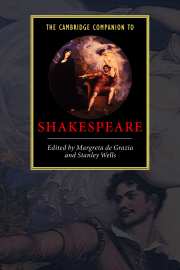Book contents
- Frontmatter
- 1 Shakespeare’s life
- 2 The reproduction of Shakespeare’s texts
- 3 What did Shakespeare read?
- 4 Shakespeare and the craft of language
- 5 Shakespeare’s poems
- 6 The genres of Shakespeare’s plays
- 7 Playhouses, players, and playgoers in Shakespeare’s time
- 8 The London scene
- 9 Gender and sexuality in Shakespeare
- 10 Outsiders in Shakespeare’s England
- 11 Shakespeare and English history
- 12 Shakespeare in the theatre, 1660-1900
- 13 Shakespeare in the twentieth-century theatre
- 14 Shakespeare and the cinema
- 15 Shakespeare on the page and the stage
- 16 Shakespeare worldwide
- 17 Shakespeare criticism, 1600--1900
- 18 Shakespeare criticism in the twentieth century
- 19 Shakespeare reference books
- Index
10 - Outsiders in Shakespeare’s England
Published online by Cambridge University Press: 28 May 2006
- Frontmatter
- 1 Shakespeare’s life
- 2 The reproduction of Shakespeare’s texts
- 3 What did Shakespeare read?
- 4 Shakespeare and the craft of language
- 5 Shakespeare’s poems
- 6 The genres of Shakespeare’s plays
- 7 Playhouses, players, and playgoers in Shakespeare’s time
- 8 The London scene
- 9 Gender and sexuality in Shakespeare
- 10 Outsiders in Shakespeare’s England
- 11 Shakespeare and English history
- 12 Shakespeare in the theatre, 1660-1900
- 13 Shakespeare in the twentieth-century theatre
- 14 Shakespeare and the cinema
- 15 Shakespeare on the page and the stage
- 16 Shakespeare worldwide
- 17 Shakespeare criticism, 1600--1900
- 18 Shakespeare criticism in the twentieth century
- 19 Shakespeare reference books
- Index
Summary
Images of racial, national, religious, and cultural difference haunt Renaissance theatricals. Indians and Moors, gypsies and Jews, Ethiopians and Moroccans, Turks, Moors, Jews, 'savages', the 'wild Irish', the 'uncivil Tartars', and other 'outsiders' were repeatedly conjured up on early modern English stages, both public and private. Sometimes such outsiders occupied the centre-stage, in plays such as Shakespeare's Othello, or Christopher Marlowe's The Jew of Malta, or in court masques such as Ben Jonson's The Masque of Blackness, or in the pageants such as Thomas Middleton's Triumphs of Truth which were enacted before the citizens of London when a new Lord Mayor was appointed. At other times they played smaller roles, like the black Moor Aaron in Shakespeare's Titus Andronicus (whose picture, drawn by Henry Peacham, is the only surviving image from this time of a black character on the stage) or Portia's suitor, the Prince of Morocco, in The Merchant of Venice, whose blackness the upright lady fears and loathes: 'If he have the condition of a saint and the complexion of a devil, I had rather he should shrive me than wive me' (1.2.109-10). Some were just shadowy presences that were evoked but never appeared on stage such as the 'lovely boy stol'n from an Indian king' over whom Titania and Oberon fight in A Midsummer Night's Dream (2.1.22) or the Moorish woman who, we are told, has been made pregnant by Lancelot in The Merchant of Venice. Sometimes outsiders are only figures of speech, conjured up to establish a point of view: in Shakespeare's Much Ado About Nothing, for example, Claudio affirms his decision to marry Leonato's niece whom he has not seen by declaring, 'I'll hold my mind, were she an Ethiope' (5.4.38) and in A Midsummer Night's Dream, Lysander spurns Hermia by calling her an 'Ethiope' and a 'tawny Tartar' (3.2.258, 264).
- Type
- Chapter
- Information
- The Cambridge Companion to Shakespeare , pp. 147 - 166Publisher: Cambridge University PressPrint publication year: 2001
- 5
- Cited by



